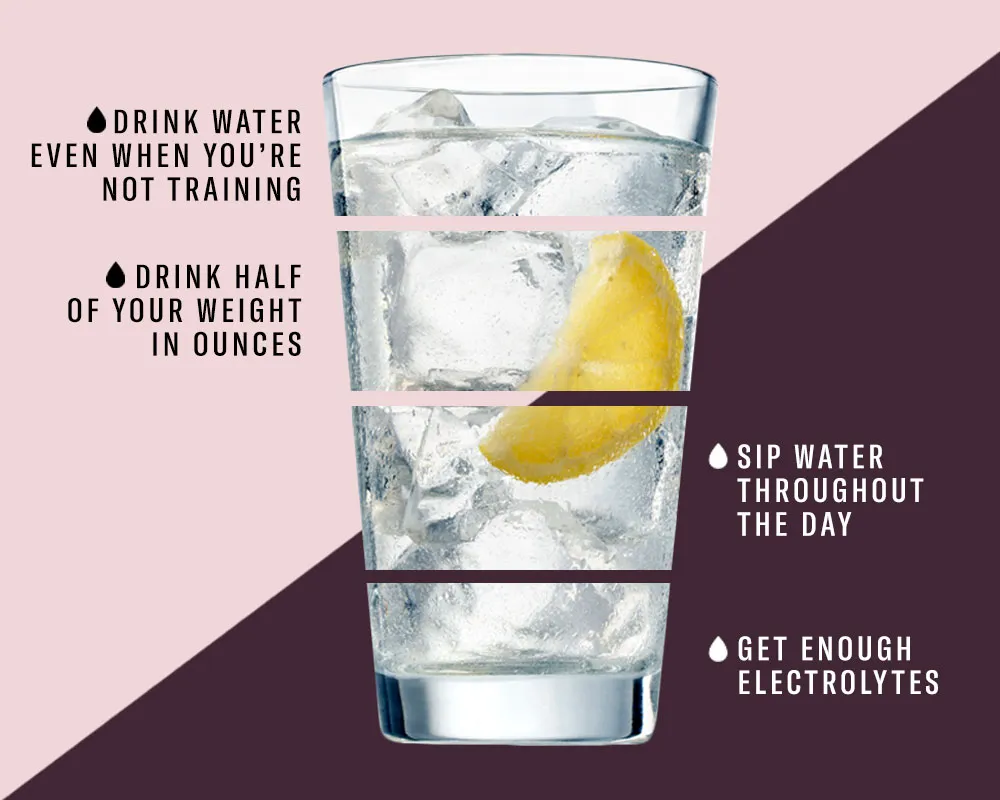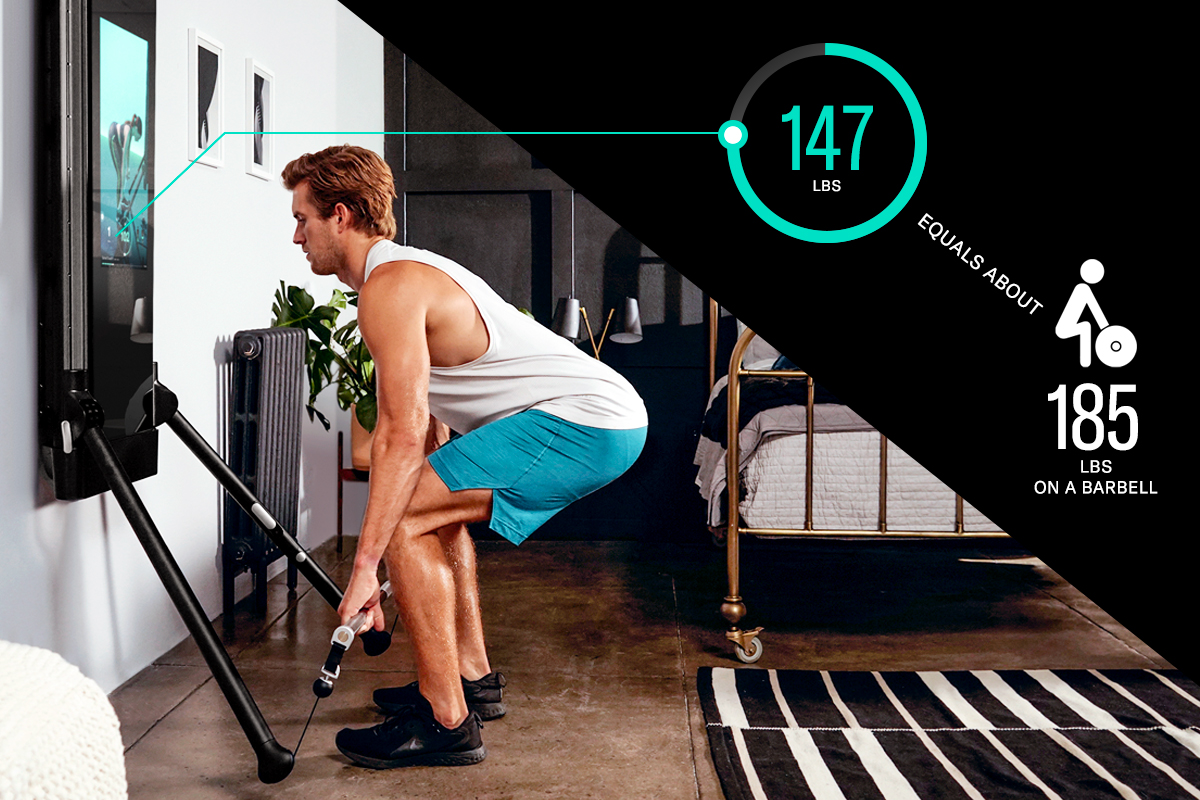Being thirsty isn’t the only signal that you need more hydration.

The human body requires hydration for nearly every physiological function, from digestion and waste elimination to thermoregulation and joint lubrication. Staying hydrated is particularly important for athletes because dehydration is detrimental to strength and stamina. Yet, many of us not only struggle to drink an adequate amount of fluid, but we also don’t know how to tell if we are dehydrated.
To help shed light on some of the lesser-known signs of dehydration, we spoke with experts in nutrition, fitness, and exercise physiology. Here’s what they had to say about monitoring your hydration status.
Signs of Dehydration
When you lose water through sweat (the body’s cooling mechanism) and it’s not replenished, your blood volume drops and the consistency of your blood becomes thicker, making it harder for your heart to deliver oxygen and nutrients throughout your body. As dehydration worsens, your body struggles to regain balance. But before the situation gets dire, you’ll likely experience a range of symptoms, some glaringly obvious and others more subtle or easy to misinterpret.
Thirst
This one is obvious: If you’re thirsty, you’re already dehydrated. This is a problem for people who wait until they feel parched to reach for a drink.
“The sensation of thirst is believed to kick in when you’re about 1 percent dehydrated. In other words, you’ve lost 1 percent of your body mass (in water),” says Fabio Comana, MA, MS, a faculty member at the School of Exercise and Nutritional Sciences at San Diego State University.
Why is that a big deal? “From a performance standpoint, we’ve seen in research that people start to suffer some sort of compromise to their performance when they start reaching about 2 to 3 percent dehydration.”
So, if you always use your sensation of thirst to gauge when to hydrate, you’re likely chronically dehydrated, and your athletic performance may suffer from it.
Workouts Feel Harder Than Normal
If you’ve ever had a workout where, despite getting enough rest, your first rep feels like your tenth, and the time on the clock seems to be moving backward, you might be dehydrated.
“Look for fatigue,” Comana says. “If you’re starting to notice, ‘I’m exercising, and this is my normal workout, and it’s really getting hard to do this workout. I’m struggling to complete this normal workout,’ that’s another sign of dehydration.”
You may also be exhausted outside of your workouts. “I think one of the main signs of dehydration, that people don’t think about, is being extremely tired throughout the day,” says Jaclyn Sklaver, MS, CNS, LDN, sports nutritionist and founder of Athleats Nutrition. You may feel lethargic with little energy to spare for exercise or recreation.
Dry Skin
If you’re constantly reaching for body lotion or reapplying lip balm, you may not be drinking enough water. “Your skin is dryer; you get chapped lips. If it’s long-term dehydration, your nails would also be brittle,” Sklaver says. Your eyes may also feel dry, itchy, or irritated.
Racing Heart
You expect your heart rate to go up as you increase the intensity of your physical exercise. But if you’re holding a steady pace and notice the numbers on your fitness tracker climbing, that may be a sign that you’re dehydrated.
“You’re moving fluid out of your bloodstream, because it’s either being lost to sweat or it’s being squeezed out by the muscle contraction, and it’s shrinking your blood volume,” Comana says. “Your heart is having to work a little harder to offset the fact that you have less blood volume. And you’re having to circulate oxygen and nutrients at a faster rate.”
Infrequent Bathroom Breaks
Your urine can tell you a lot about your hydration status. Ideally, it should be light yellow like lemonade. If it starts to get into darker, apple juice-like territory, you’re likely dehydrated. The same goes for urine with a stronger-than-usual smell.
“What smelly urine really indicates is that it’s just more concentrated,” explains Tim Landicho, CPT, Tonal coach and nutrition coach. Without urine’s water content, you smell more of the waste products that are being excreted by the body.
Landicho also recommends keeping track of your bathroom breaks. “Usually, peeing less than five times a day is going to be an indicator that someone’s not getting enough water,” he says.
Brain Fog or Moodiness
We often attribute a slow reaction or time, poor short-term memory, or an ability to stay focused to a lack of sleep. But many of these symptoms of brain fog can also be due to dehydration.
In one study published in the International Journal of Environmental Research and Public Health, participants who ate regular meals but abstained from drinking water for 36 hours scored lower on cognitive performance tests than they had prior to becoming hydrated. Once they rehydrated, their scores improved. Drinking water also alleviated participants’ total mood disturbance.
That’s right–dehydration can make you moody. “Hydration plays a huge role in balancing mood,” says John Christie, RD, CSCS, a registered dietitian and Tonal’s Director of Curriculum Intelligence. “If your mood is feeling a little bit off, and that goes hand-in-hand with feeling tired and producing a bit less power (during your workouts), that could be a signal that you’re dehydrated.”
Temperature Changes
If you’re dehydrated, your skin may be paler than usual and cool to the touch. Or, it may be red and hot to the touch. You may also feel a little lightheaded, have headache symptoms or feel confused.
According to Comana, these are signs that your thermoregulatory system, which maintains your internal temperature, is starting to falter. “It’s generally indicative of the fact that you lost too much body water, and your circulatory system is struggling to maintain circulation to the muscles and, at the same time, remove the heat that your muscles are producing,” he explains.
Someone with these symptoms could be at risk for heat exhaustion. The smartest thing to do, Comana says, is to stop exercising, retreat to a cool environment, and drink fluids.
Headache or Muscle Cramps
While significantly different symptoms, headaches and muscle cramps are alike in that they fall under the “maybe” category for signs of dehydration. Muscle cramping can be attributed to other things beyond dehydration such as muscle overuse, nerve compression, or electrolyte deficiency, but if you are experiencing it in tandem with other signs of dehydration, it may be a warning.
Headaches may also be a bit of a red herring, only because they’re a symptom for nearly every common medical issue, explains Comana. But a headache coupled with other symptoms, like brain fog, fatigue, or a subpar sweat session, could be a sign.
So What Causes Dehydration?
Most people who become dehydrated simply aren’t drinking enough water. Your ideal intake depends on a myriad of factors including physical activity levels, climate, and the rate at which you sweat, but you can use your body weight in pounds to generate a rough estimate, explains Landicho.

“A good benchmark is half of your body weight in ounces,” he says. So, if you weigh 160 pounds, aim to drink 80 ounces, or 10 cups of water throughout the day. With that number as a baseline, you can use the color of your urine to monitor your intake and adjust accordingly.
However, even well-meaning individuals who think they’re staying on top of their water intake are prone to some common hydration mistakes. If you find yourself struggling to stay hydrated, you may be guilty of one or more of the following:
Focusing on hydration ONLY when training. “Hydration is a 24-hour thing,” Sklaver says. Even when you’re not exercising, your body needs water to function and perform everyday tasks. And, if you allow yourself to become dehydrated between workouts, that means you’re going into your training at a deficit. “You have to be drinking water around the clock. You have to stay on top of your hydration, even on a rest day,” she says.
Chugging instead of sipping throughout the day. Ever try to “make up” for not drinking enough throughout the day by downing a full bottle of water in one shot? It’s not an effective strategy, says Comana. “The body can’t preserve all that fluid coming in too rapidly,” he says. “We have receptors that say, ‘the fluid is too much,’ and push it out to urine.” Your best bet is to sip water throughout the day rather than consume it all at once.
Ignoring electrolytes. Electrolytes (primarily sodium) are needed to pull water into the bloodstream. If most of your workouts are under an hour, and you’re exercising in a climate-controlled setting, the sodium in your diet is likely sufficient. But if your workouts are long and super-sweaty, or you notice that your sweat stains are leaving a salty residue on your clothes, you’ll want to use an electrolyte beverage to aid in rehydration.
Drastically cutting carbs. Landicho explains that when you significantly reduce your carbohydrate intake, you cut out whole food groups that contain water such as fruits and vegetables. “Also, carb storage increases water storage in the body,” he says. “For every 1 gram of glycogen (stored glucose) we store in our muscles and liver, we store 3 to 4 grams of water. So if carbs are extremely depleted, water is going to be extremely depleted as well,” he says.

Related story: 5 Tips for Staying Hydrated, Beyond Drinking More Water
How Should You Treat Dehydration?
The best dehydration strategy is to prevent it in the first place: Sip water throughout the day, eat plenty of water-filled fruits and vegetables, stick to a hydration plan, and regularly monitor your urine.
But if you do become dehydrated, the only recovery option is to replenish your body’s fluids as quickly as possible. Electrolyte drinks are widely available and, as mentioned above, help pull water into the bloodstream. Comana recommends choosing one that contains 100 to 165 milligrams of sodium and 18 to 45 milligrams of potassium per eight-ounce serving.
If your dehydration symptoms become severe (e.g., your heart rate goes from elevated to racing, or your brain fog turns to confusion), include vomiting or diarrhea, or you stop sweating altogether, it’s time to seek medical attention, as you may require intravenous fluids and ongoing monitoring.
The information provided in this article is for educational and informational purposes only. Individuals with pre-existing health conditions, injuries, or concerns should consult with their healthcare provider before trying a new exercise or nutrition regimen.


